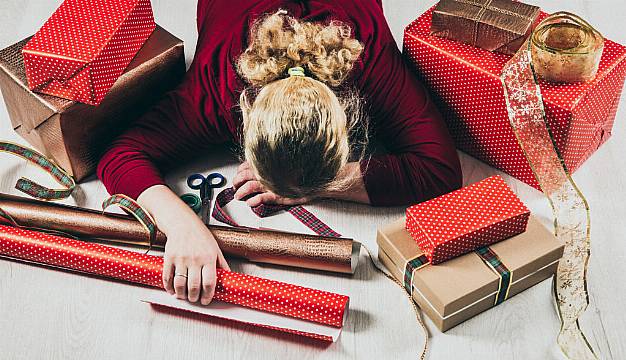The festive season may be twinkly and bright and laden with tasty treats, but there’s no denying it has a way of sending our stress levels soaring.
Sure, a few days of feasting, making merry with loved ones and gorging on movies and chocolate sounds lovely – but do we really have to push ourselves to the brink of burnout in the process?
Who is calling the shots?
“This time of year has become notorious for stress, so in a way, we expect December and Christmastime to be stressful. That’s the first thing – does it actually need to be stressful, or are we being overly influenced by marketing pressure, and the need to do everything just right for everyone else?” says registered psychotherapist Beverley Blackman.

If you really want to be doing Christmas a certain way, that’s one thing. But if you’re not even sure you’re enjoying it, maybe it’s time to reassess.
“Take a breath and slow down. It helps to try to figure out what your priorities might be when you are feeling stressed,” says Blackman. “It may also help to remember that engaging with the pressure to buy, drink, eat, party is a choice – you can choose whether to engage or not, and if you do, how much to engage: it really is your choice.”
Build in boundaries
On the flip-side, stress doesn’t automatically mean we’re going about things all ‘wrong’ and need to change everything. It’s when it tips into unmanageable territory, and possibly starts harming our health and relationships that it’s an issue – and this is where compromise and boundaries come into the mix.
“If there is a social event you really cannot avoid, but you don’t really want to go to, can you give yourself a time limit and just go for a couple of hours? If there are two parties on one night, then be honest with yourself – which would you rather go to? Where are you going to enjoy yourself more?” suggests Blackman.
“If you are worried about disappointing a friend by not going to their social event (or there is something you simply don’t want to go to), it is perfectly OK to say no. You don’t have to give a reason – you can just say that you would love to be able to come, but that you’re unable to make it. How about softening the blow a little by saying you’d love to meet them for a coffee or drink soon, so that you can catch up properly? People know December is a whirl, and do realise that not everyone can make everything. It’s absolutely fine to be selective about what you do.”
Take the pressure off
Christmas can bring high expectations, too, with pressure to make everything magical and wonderful. Blackman notes: “We will often put pressure on ourselves to make everything perfect – and when we do this, it is worth recognising whether ‘perfection’ is a tendency we habitually lean towards, and so recognising whether this pressure genuinely comes from outside of us, or we are putting this pressure on ourselves? Linked to the need to have things perfect are usually thoughts along the lines of, ‘I should…’, ‘I must….’, ‘I have to…’, ‘I ought to….’. These are things to hold in mind if you find yourself tilting towards the pressure of being perfect. Remind yourself that being perfect is really not possible.
“If you are throwing a party or having people over, remember there will be far more interest in people catching up with each other and having a good time than focusing on your house, your decor, your cooking,” she adds. “Give yourself plenty of preparation time to minimise anxiety – if you are cooking, cook something simple (preferably not something new); decorate the space as you like it (it’s your party, after all), and focus on enjoying yourself as well as hosting.”
Money matters

For many people, the cost and pressure to over-spend is a major seasonal stressor. “There is a lot of expectation out there that you will be able to spend and keep up with everyone else,” Blackman acknowledges. “The key here is planning and prioritisation.”
Remember, other people don’t necessarily know your financial circumstances. So make a budget that works for you – and if you do tend to overspend and suffer the consequences later, think about what you could be doing differently and why that keeps happening.
“Above all, remember that the connections you have within your friendships and relationships are more important than gifts,” says Blackman. “So it’s not necessarily about the amount you spend, but about the process of choosing and gifting something to someone, and the enjoyment that you both will derive from whatever you choose to gift.”
Also, chances are others are in the same boat and would be more than happy to enjoy a winter walk together or chip in on a pot-luck lunch, rather than spend money for the sake of it!







